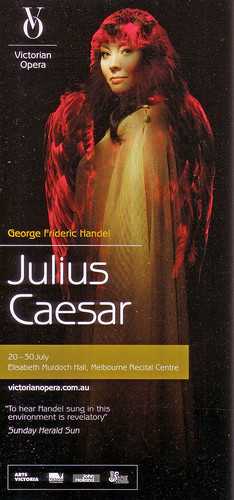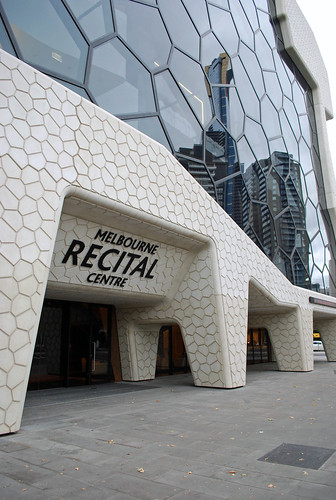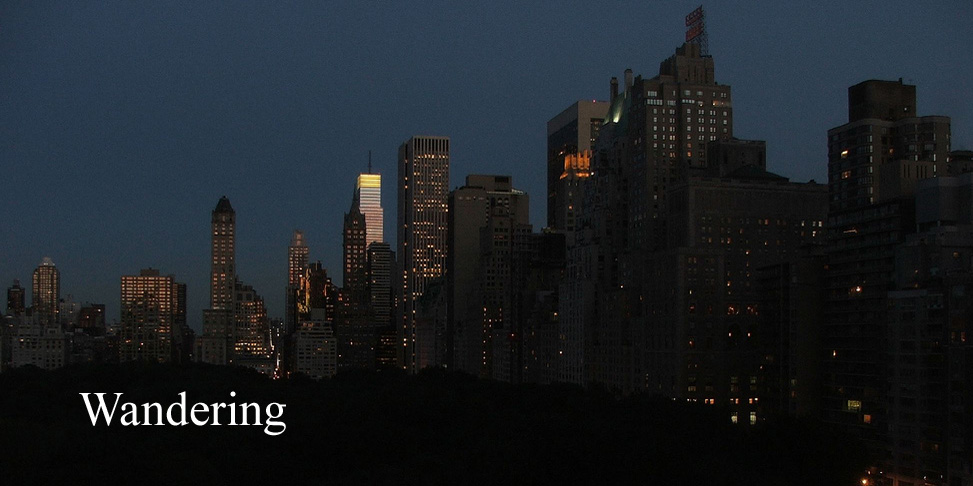
The second event on my visit to Melbourne was the Victorian Opera production of Handel's Julius Caesar at the Recital Centre. I had been less than enthusiastic about three VO productions heard earlier; and was also sceptical about the use of the Elizabeth Murdoch Hall in the Centre for opera. I'm not critical of the use of a space without a traditional stage: operas staged by Pinchgut Opera in the City Recital Hall in Sydney have been excellent overall and musically outstanding.
However, on my previous visit to the Melbourne hall at the time it was opened in 2009, I heard chamber music, (Schubert's Trout Quintet played by the Goldner Quartet with Piers Lane and Alex Henery and a late night concert which introduced me to Morton Feldman's haunting Rothko Chapel), for which the acoustics of the hall were perfect, and a performance of some opera excepts and Vaughan Williams Serenade to Music, with Orchestra Victoria conducted by Richard Mills and singers, which I thought was not as well suited to the space.

The Elizabeth Murdoch Hall is lined with timber, and I could smell the wood as I came in: I hope this natural aroma therapy will last.
For Julius Caesar, the orchestra was placed in front of the stage. The simple all purpose set included an obelisk, Cleopatra's Needle perhaps, reaching almost to the ceiling and some thin drapes hanging from a rail attached to the roof, which were opened and closed during the performance.
As soon as the orchestra played, my doubts about the quality of the music were extinguished. The ensemble from Orchestra Victoria conducted by Richard Gill, the artistic director of Victorian Opera, played beautifully. The orchestral sound was balanced and well articulated. If I wanted to find fault I would say that the hall was not quite as kind to the singers, as I thought I noticed a little too much reverberation at times. But overall I was enchanted. I should have allowed myself enough time in Melbourne to hear it more than once. So much for scepticism.
I don't think I had heard David Hansen the countertenor who sang Caesar before. He has a remarkably agile voice, his high notes in particular had great clarity of tone. Tiffany Speight was a fine Cleopatra, and it was interesting to hear Tobias Cole ( Oberon in OA's Midsummer Night's Dream earlier this year ) as Tolmeo. He sang Caesar in the most recent revival of OA's famous production. The other singers were excellent as well.
It may not be a universal rule, but I think there is much to be said for staging 17th and 18th century opera in small theatres and halls. I know that when Handel's opera's were first performed the rather static nature of the opera seria was mitigated by the use of elaborate scenic effects; but I'm not certain about how large the theatres were. I have seen the OA Julius Caesar, first performed by Yvonne Kenny and Graham Pushee in 1994, in both Sydney and Melbourne. Those theatres were fine for the music and the space allowed for elaborate and effective staging. I was, however, disappointed by David McVicar's production, originally for Glyndebourne, which I saw at Chicago Lyric Opera in 2007. I will mention some aspects of the production later, but my overriding impression was that the theatre was too large for the work which lacked impact for that reason. It's seen from a distance, and though there are singers who are powerful enough for a large auditorium many fine artists are not. In Chicago, French countertenor Christophe Dumaux, who sang Tolemeo, seemed much more suited to the space than David Daniels, who sang Caesar.
The VO production was directed by Steven Heathcote who recently retired after an outstanding career as a principal dancer with the Australian Ballet. His background in dance was reflected in some aspects of the production, which I thought was well suited to the hall and enhanced the excellent music. I disagree with the critic for the Melbourne Age, who wrote: "All too often, what we were seeing on stage seemed superficial to what was being played and sung."
The static nature of opera seria creates problems for the modern director, but those problems were elegantly solved here. Two examples:
Towards the end of Act 1, Caesar sings the remarkable aria with horn obligato "The skilful hunter treads silently when stalking his prey". In Francisco Negrin's OA production this was done with Caesar and Tolemeo confronting one another around a large table covered with a green baize cloth. It was a thrilling piece of theatre. David McVicar's production picked up a dance rhythm in the music and had Caesar and Tolemeo performing a kind of gavotte which seemed to drain the dramatic tension from the scene. The VO production, with less elaborate resources, depicted the scene as a confrontation in a way which did enhanced the music.
Another highlight of the OA production was the aria -
" If in the pleasant, flowery meadows, the bird among flowers and leaves, conceals itself, it only makes its song more delightful.."
in which Caesar steps out of character and conducts a kind of duel with the accompanying violinist as they compete to find the highest note. This was also very effective in the theatre. (The applause and foot stamping can be heard on the live recording ).
Chicago also had the violinist on stage without the same theatrical effect, but Steven Heathcote's solution was to have a dancer depict the bird of the lyric sometimes eluding Caesar's reach but when caught allowing the singer to try a few lifts from the ballet. It created a nice effect.
Apart from the obelisk, the Melbourne production was not intended to accurately represent Caesar and Cleopatra in their historical context, but it was straightforward and effective. The much more elaborate Chicago production was a sly representation of British Imperialism, which despite the comic effects had a Serious Purpose. Mr. McVicar says in the program: " On some level this is an opera about what happens when you walk into other people's countries under false pretenses". So there.
I find that it is now 40 years since I first heard Julius Caesar. I mention this because over that time there has been a change in the performance practice for opera seria, most of which included parts for the then prevalent castrati. I saw the first stage performance of Julius Caesar in Australia presented by Young Opera at the Science Theatre, University of New South Wales. Ceasar was sung by one of the great Australian singers, contralto Lauris Elms and Cleopatra by the equally celebrated Marilyn Richardson. Here is the cast list:

As with many programs there is no indication of the year, but looking in Lauris Elms' memoir The Singing Elms I find it was 1970. She says (at the time of her writing): "Twenty-five years later people still remember those performances." And Forty years later as well.
Alfred Deller's career as a countertenor was well established by then, but the voice did not have the prominence it does today. I bought a LP record of highlights of the opera as performed by New York City Opera after hearing it in 1970. Beverly Sills is Cleopatra, but Caesar is sung by a bass baritone, Norman Treigle.
As late as 1999, we have a female Caesar at the Met, in a performance I found on the Met Player:
Jennifer Larmore and Sylvia McNair as the ill-fated couple, abounds with dazzling vocal pyrotechnics as well as heart-rending drama. Stephanie Blythe (Cornelia) and David Daniels (her son Sesto) give memorable performances as the grieving family of the murdered Pompey. Brian Asawa sings Cleopatra’s conniving brother Tolomeo.
I was surprised to see David Daniels, Caesar in Chicago, was Sesto. In 1970 David Parker, a tenor, sang this role, but in the other productions I have mentioned Sesto has been sung by a contralto.
* Julius Caesar, Victorian Opera at Melbourne Recital Centre; 22 July 2010.

No comments:
Post a Comment